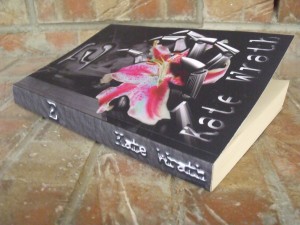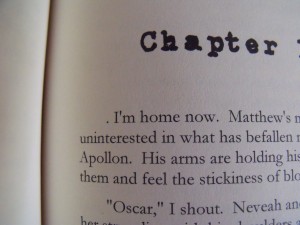Another one for my fellow writers:
Some of you might struggle with starting a story, developing characters, or keeping the plot from lagging in the middle, but for me, the ending is definitely the most difficult part of writing a story. I can tell you exactly why that is, with hardly thinking about it: I don’t want my stories to end. When I write my characters, they become real to me. The only end is death. So, until my characters die, there’s no ending for me, the author. But no, I’m not going to write about their geriatric adventures (at least, I don’t think I am), so there has to be an ending.
Perhaps this is why I love series so much. Whether it’s in writing or on TV, I’m there. I like when a story goes on and on. Characters continue to develop, change, and grow. That makes me happy. I’m all about characters. But at some point, plot plays itself out, and it is time to end. It’s inevitable. For the reader, there must be an end. That means the author must, at some point, sever the line between the current journey and the geriatric adventures (unless you’re willing to kill all of your characters off, which, hey, could be fun.)
So how do you approach the ending? How do you approach the multiple endings between books in a series? There’s no perfect answer to this question. However, there are some things you can consider that might help.
Some of the best advice I’ve heard is to write the first few endings you imagine, and then throw them away. Yeah, it’s kind of a waste of time, so I do my own version of this in my head. I come up with the expected ending, and 99.9 percent of the time will not use it. Every once in a while, an expected ending is called for. I don’t think there’s necessarily less reader satisfaction because the ending is expected. Not if it is well-written and done right. But that kind of thing has its place, and I don’t think it works for what I’m writing. So getting rid of the “canned” endings is something that really helps me.
The worst advice I’ve ever received about endings came from the professor of a creative writing course I once took. I wish I had never taken this course, because the professor was one of those people who thought of herself as the-writer-of-all-writers, and if you didn’t write the way she did (old lady memoirs), then you weren’t doing it right. This course killed writing for me for a long time. Really sad. So, to be completely evil, I’m going to pass on this horrible advice for you. (I’m actually reluctant to do so. However, I feel it is my duty to the universe to reveal this astoundingly awful advice and tell you, if anyone ever tells you this, don’t listen.) So, here it is: There are only four endings. 1. The character gets what they want and they’re happy about it. 2. The character gets what they want and they’re not happy about it. 3. The character doesn’t get what they want and they’re not happy about it. 4. The character doesn’t get what they want and they’re happy anyway. *Screams*. Aside from the fact that this reduces the art of writing to some trite formula, it is clearly not true. It may have some truth in it… a lot of endings do fit within this scope, if you strip them to skeletal level. But not all. I give you Frank Stockton’s famous short story, The Lady or the Tiger? in which none of these endings occur. I have always absolutely loved this story, and it’s ending is what made it. So there.
So what else do you need to know? Consider your readers’ feelings. Yes, it is good to surprise. If you’re writing a series, you want to leave an open door and some unanswered questions to pull your reader into the next book. However, you don’t want them to hate you. You want to give them what they came for. In a series, it is particularly hard to find this balance because, of course, you still have a lot of story to tell in order to provide the answers and satisfaction. I tried to achieve this balance for the end of E, and I think I did a decent job of it. One of my beta readers screamed and asked me for the next book. My editor (whose writing advice I trust beyond anything) praised the ending as a skillfully executed navigation of a difficult task. As reviews have come in, some have thought the ending provided adequate closure while leaving the story open, and some have been… well… screaming and demanding the next book. This is a place that I’m happy with as an author. I don’t purposely leave my readers dangling, but there is more to this story than can be told in a single book. And I’m writing as fast as I can to get the next one out.
So, on the topic of considering readers’ feelings, let’s talk about Veronica Roth’s Divergent series. (Spoiler alert.) I will give her kudos for the fact that killing off her main character was a bold move, but I felt that it was also contrived simply for the shock effect. It did create waves. But were reader’s feelings taken into account? Was anyone actually satisfied by that ending? From the way that her fans have responded, I think she got a fairly resounding “no” on that question. (Personally, I mentally checked out about 1/3 of the way through Insurgent, when I felt the main character had no reason or motivation to back up what was happening, and my suspension-of-disbelief could just not cover it anymore. That makes it hard to say if I was satisfied by the ending or not, though I would guess not.)
Let’s look at Suzanne Collins’ The Hunger Games trilogy instead. (Still spoilers….) Were the readers’ feelings taken into account? I’d say yes. I don’t know about you, but I was just yearning for Katniss and Peeta to finally be together after all they had been through. I wanted them to have their happily ever after. This could have been one of those .01 percent endings where it might have been OK. Did Collins do the happily ever after? Noooooooooo! (And yes at the same time.) Katniss and Peeta got together. They did. But it wasn’t a grand sweeping moment from a fairytale with the big smooch and all. It was subtler, gentler, slower, and crafted with great care to emphasize the long-lasting effects of social violence. It was about the scars. It was real. There was damage that could not simply be undone by a kiss. Beyond that, Collins really seized hold of the opportunity to whap the reader with the big picture. The kids not knowing they were dancing on top of a mass grave– that got me. I know some people didn’t like this ending, but I think it was perfect. I was satisfied. I was left thinking. This ending kind of haunted me. Perfect.
Taking the idea beyond just the readers’ feelings, a good ending pays careful consideration to theme. You may be writing something lighthearted– a quick and fun read– but that doesn’t mean that you don’t have something bigger to say. I’m not saying get on a soap box or anything. Please don’t. But find the deeper themes in your story, and bring them out in the ending. An ending should have meaning. In E, (no spoilers, hopefully), I wanted to bring out the interplay of good and evil, the impact of our choices, and the weight of conscience (for starters). To do this, I brought back some of the symbolism that had been used throughout the story. I also added some dialogue with multiple meanings. Sure, it can be read straight up, but there’s more to it, if you are a more-to-it kind of reader.
I’m currently trucking toward the end of my second book in the E series. I’ve not released the title yet, so we’ll just call it TMT. To be honest, at this point my story is getting a bit epic, and I am not sure exactly where this book will end. I do know that there is no way I can completely wrap up the plot in this one book… unless you want it to be a thousand pages… so my readers can expect some loose ends with this one. That being said, a good ending needs to provide some answers, and I’m working hard right now to figure out how many answers I am willing to give. I think I have it figured out to some extent. I have somewhat resigned myself to the fact that one of my characters’ major concerns cannot be resolved within the scope of this book. It just isn’t possible. However, I have worked out a milder, though temporary, resolution through an event that was going to happen anyway, that will hopefully give my readers some sense of closure. I don’t think I could end this book without it. The other major plot line does come to an end, or rather, a beginning. The ending will result in a lot of new information, and a big reveal. Of course, this leads on to new things, and more to come. It’s not set in stone yet, but I think I’m feeling pretty happy with the decisions and they are starting to solidify in my mind. That said, I always leave myself open for the story to take me somewhere else, so who knows. It’s not over ’til it’s over.
I’d love to hear from the other writers out there on their battles and successes with endings. I’d also love to hear from readers about favorite and least favorite endings. What makes or breaks an ending for you?
…and a link to Chapter 1 of E.
Make an author happy. Share this:


